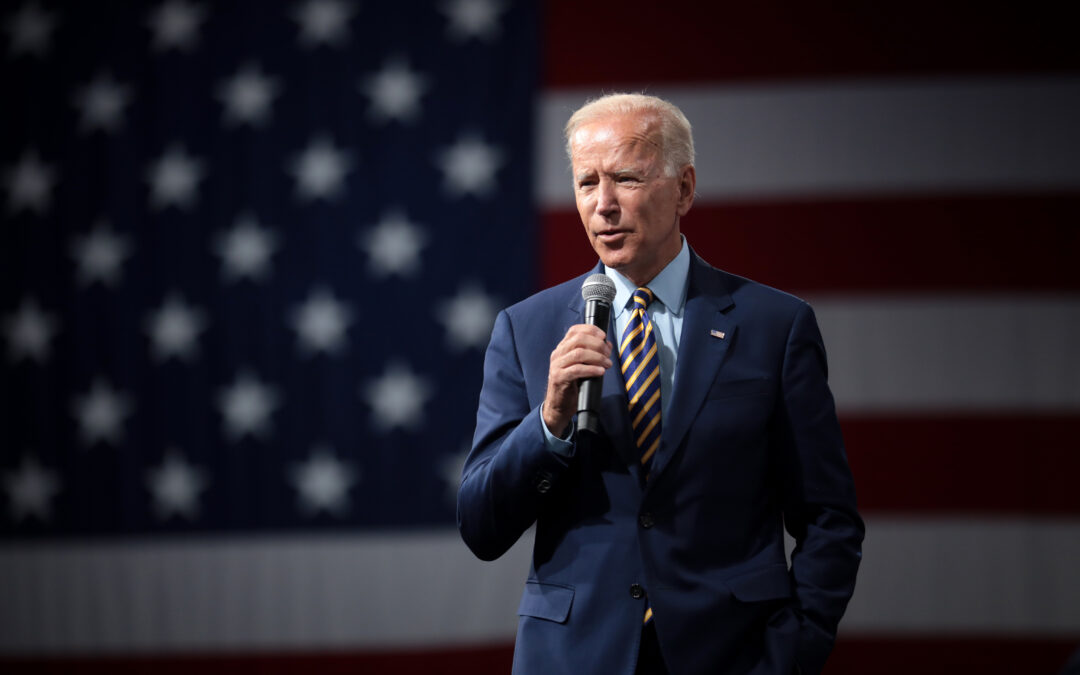By Marcin Zaborowski
Poland’s populist government is losing a close ideological ally in Donald Trump. But strategic relations can remain strong – and perhaps be even stronger – under Joe Biden. Much will depend on how Warsaw reacts to a US president likely to be more critical on issues such as the rule of law and LGBT rights.
Poland’s government and its supporters have been rooting for Donald Trump. Polish state TV, which is under the influence of the ruling party, has in its coverage of the presidential election often reproduced Trump’s conspiracy theories about alleged voter fraud and a “stolen election”. Government-friendly private media have eagerly published pieces bad-mouthing Joe Biden and trumpeting Trump.
Poland's public TV news for the second night running suggests that election fraud may be happening in the US (presenting accusations and only talking to people supporting Trump's side). If Biden wins, some viewers may have the strong impression he is not legitimate.
— Stanley Bill (@StanleySBill) November 5, 2020
The ruling Law and Justice (PiS) party has recognised Trump as an ideological kindred spirit and a rare friend on the international stage. The government it leads has been frequently criticised and at times left isolated in the European Union over a protracted dispute over the rule of law as well as ideological issues, such as LGBT rights.
By contrast, earlier this year, when PiS-backed President Andrzej Duda was himself standing for re-election, Trump invited him to the White House for a photo opportunity and show of support just days before the vote.
However, although Polish-American relations have been developing well during Trump’s presidency, a sea change in Washington need not derail them. In fact, in areas such as policy towards the post-Soviet space, Warsaw may find that it has more in common with Biden’s White House than the administration of his mercurial predecessor.
Whether the relationship stays on track will, however, depend first and foremost on the Polish government’s ability to adjust to the new circumstances.
Polish Trumpophilia
Polling shows that, if Europeans could vote in the American elections, then Trump would lose across the board – with the exception of Poland. Earlier this year, the Pew Research Center found Poland to be the only nation in Europe where a majority said they have confidence in Trump. A survey last month by CBOS found that 41% of Poles believed Trump would be a better US president than Biden, compared to only 15% who favoured the Democrat.
There are two fundamental reasons for Polish enthusiasm for Trump. First, Poles have long been broadly pro-American and also have a positive association with the Republican party – especially with Ronald Reagan, who is credited with ending the Cold War.
Second, under Trump’s presidency, Polish-American relations have become closer. Although it was the Obama-Biden administration that decided to locate 4,500 US troops in Poland as part of the European Reassurance Initiative, as well as taking the lead in NATO’s Enhanced Forward Presence in Poland, the decision was mostly executed during Trump’s subsequent term in office.
Trump has also objected to the Nord Stream 2 pipeline to transfer Russian gas to Germany through the Baltic Sea while bypassing Poland – a project that has sparked staunch opposition from Warsaw. It was under Trump that US companies started delivering liquified natural gas (LNG).
The Trump administration has also strongly supported the Polish-led Three Seas Initiative that promotes regional integration across Central and Eastern Europe (CEE).
In addition to this strategic support, there is also an ideological proximity between the Trump administration and Poland’s ruling camp. Trump has refused to criticise the Polish government for its violations of the rule of law at a time when Poland was facing condemnation from many of its other Western partners.
Some areas of tension between Warsaw and Washington have, admittedly, remained. One flash point has been the Polish ruling party’s criticism of US-owned Polish television network TVN, as well as the Polish government’s attitude towards LGBT rights. Both have been strongly criticised by the Trump-appointed US ambassador, Georgette Mosbacher.
These differences notwithstanding, the relationship has been exceptionally cordial, as highlighted by Duda’s election-boosting visit to the White House in June. PiS will therefore perceive the imminent change in Washington with anxiety, if not open hostility. It has developed no contact with Biden’s team and has little know-how on how to manage its relationship with the incoming US president.
Changes at the White House
The prospects for US-Polish relations under Biden’s presidency should be considered on two levels: values and ideological proximity and, separately, material interests and policies.
On the ideological level, it should indeed be expected that Warsaw’s relations with Washington will become less cordial and probably even tense.
Biden seems to view the Western alliance as a community of values. His comments during the campaign – for example when he likened Poland to Hungary and Belarus – suggest that he views PiS as one of the violators of these professed values.
"You see what's happening in everything from Belarus to Poland to Hungary and the rise of totalitarian regimes in the world and this president embraces all the thugs in the world," said @JoeBiden at his town hall event last night pic.twitter.com/Ix8R8bhQNc
— Notes from Poland 🇵🇱 (@notesfrompoland) October 16, 2020
The Polish government may therefore expect coming criticism of its violations of the rule of law, as well as its approach towards issues such as freedom of speech and LGBT rights. Hence, the period of ideological proximity between Washington and Warsaw is now over.
However, this divergence may not spill over into material policy, depending on how Poland plays its cards. The Biden administration’s policy towards Poland is likely to be one of continuity when it comes to security and defence, energy, and regional co-operation in Central and Eastern Europe. Yet, there may be some caveats.
As far as security and defence are concerned, there are two aspects of essential importance to Warsaw. One is the continuation of the US presence in the context of the European Reassurance Initiative and NATO’s Enhanced Forward Presence (led by the US in Poland). The other is the continued sale of US defence equipment to Poland.
Biden is a strong Atlanticist and an advocate of US investment in CEE and Poland’s security. As a senator in the late 1990s, he was one of the most vocal supporters of Poland’s accession to NATO. As Obama’s vice president he was the main architect of the European Reassurance Initiative that resulted in a substantial US military presence in Poland.
The Polish government has lobbied the Trump administration to further boost US troop numbers on its soil, making them into a permanent presence. However, although Warsaw offered to foot the entire bill for additional reinforcements – and even to name a potential American base “Fort Trump” – the tactic led to a mere boost of 1000 rotational troops.
Since Biden was in fact the architect of US military presence in Poland and NATO’s reinforcement on the alliance’s eastern flank, there is no reason to believe that US-Polish military co-operation will be negatively affected.
As regards the sale of US military equipment to Poland, there are also no grounds to think that this would be in any way discontinued. The State Department has already approved planned sales to Poland, hence confirming it as one of America’s strategic partners.
Such decisions are also commercial, and as long as Poland is willing to proceed with defence acquisitions from US defence companies there is no reason to believe that this process may be significantly affected by political considerations.
One thing that may put a pause on the planned acquisitions – including missile defence systems from Raytheon and F35 combat planes from Lockheed Martin – may be Poland’s own budgetary limitations caused by the economic impact of the coronavirus pandemic.
Lockheed Martin has announced that it is starting to build a new factory in Poland that will produce parts for Patriot missiles.
The facility is part of the agreement for Poland to purchase a Patriot missile defence system from the US https://t.co/i5fT3nuvAl
— Notes from Poland 🇵🇱 (@notesfrompoland) September 8, 2020
As for energy, Biden has repeatedly stated that his administration will continue to support Central and Eastern Europe’s independence in this area, not least by promoting interconnectedness of regional energy networks. This is consistent with the agenda of Poland’s government and its (mostly state-owned) energy companies.
Biden has also criticised the construction of Nord Stream 2 and declared that his administration will resist it. In divergence from Trump’s position, however, Biden has not mentioned the threat of sanctioning German companies involved in construction of the pipeline. This suggests that, while Biden will support CEE’s energy independence, this will be done without the anti-German bias that has often marked Trump’s rhetoric.
Biden’s approach to regional co-operation in CEE will be marked by both continuity and divergence. His administration will be more interested and engaged in the post-Soviet space.
Biden’s approach towards Ukraine, Belarus and Russia are much closer to Poland’s point of view than Trump’s has been. Biden will not engage in ambivalent flirtations with Putin and he will be a strong supporter of Ukraine’s territorial integrity and independence. Biden is also likely to take an openly critical position towards Alexander Lukashenko’s regime in Belarus.
While on all of these matters Biden will make a far more reliable partner for Warsaw than Trump, the new US administration may review its engagement in the Three Seas Initiative (TSI). Biden is likely to support regional integration in Central and Eastern Europe, but this will probably only happen as long as it is seen as complementary to broader European integration.
Any suggestion that the purpose of TSI is to constitute an alternative to Western integration and a counter-balance to alleged Franco-German domination in the EU (as is often pronounced in Poland’s pro-government media) is likely to give Biden’s administration reservations.
It’s up to Warsaw
Throughout his long political career both in Congress and as vice president, Joe Biden has demonstrated a strong interest in and understanding of Central Europe and Poland. There is therefore little reason to doubt that his administration will seek to continue co-operating with Warsaw. However, it is also clear that there is a gap in values between Biden and Poland’s current government when it comes to issues such as rule of law and LGBT rights.
Let me be clear: LGBTQ+ rights are human rights — and “LGBT-free zones” have no place in the European Union or anywhere in the world. https://t.co/zc8YvSq6iN
— Joe Biden (@JoeBiden) September 21, 2020
The US has on many occasions demonstrated that it takes a long-term approach towards this region, one that is not swayed by political considerations. Trump’s approach towards Poland was marked first and foremost by continuity with the policies designed by the Obama-Biden administration. As the architect of these, Biden is likely to continue the current course.
The Polish government will, however, have to get used to a US administration that may be critical of some of its domestic policies, that is pro-European, and that does not engage in criticism of Germany and other European partners. Where the Polish-US relationship will remain strong and continue to develop therefore depends above all on how Warsaw reacts to the fact that its strategic partner is no longer also an ideological one.
Main image credit: Gage Skidmore (under CC BY-SA 2.0). Author bio image credit: Olgierd Syczewski (under CC BY-SA 3.0)





















